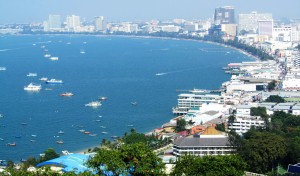Thailand has been issuing deeds to private real estate ever since the Department of Land was established in 1901. Over the years, numerous land reform initiatives have resulted in some confusion over who owns what. A wide variety of official documents are used to show land ownership, some of which are less persuasive than others.
There are two classes of documents which can be used to establish land ownership in Thailand. In the lower class, the Por Tor Bor 5, Bai Jong (NS-2), and Sor Kor 1 (SK-1) are used to establish a claim to land. These documents do not confirm ownership of land. Land whose ownership is only evidenced by one of theses documents cannot be leased or sold. As the claim matures, the Land department may eventually be grant a real title to land based on these claim certificates.
 A higher class of documents is used for land claims have been at least partially confirmed by the Land Department. These include the Nor Sor Sam (NS-3), Nor Sor Sam Gor (NS-3K), and Chanote (NS-4). Land parcels represented by these title documents can be mortgaged, leased, and sold.
A higher class of documents is used for land claims have been at least partially confirmed by the Land Department. These include the Nor Sor Sam (NS-3), Nor Sor Sam Gor (NS-3K), and Chanote (NS-4). Land parcels represented by these title documents can be mortgaged, leased, and sold.
Occasionally the Land Department revokes a title. This happens when the Land Department discovers the original land claim the title is based on was fraudulent or unlawfully claimed government land. These errors may persist for decades before they are discovered and the title is revoked. Although the errors are usually not the fault of the present landowner, the landowner does not receive compensation when their title is revoked. The best way to avoid this pitfall is to buy a property represented by a Chanote deed, which has the highest credibility.
Thai deeds to land only provide a presumption that the landowner owns the buildings on their land. Owning land does not by itself prove ownership of buildings, but is only considered evidence in favor of owning the buildings. Sale agreements or construction permits provide additional evidence of building ownership. Remember that a landowner cannot sell you a building on their land unless they own the building!
Thai law generally forbids foreigners from owning real property in Thailand. The most prominent exception to this general rule is condominium ownership. Foreigners who pay for their Thai condo purchase with foreign currency are allowed to by up to 49% of a condo development (calculated as 49% of the projects total sell-able area). The Or Chor 2, or Condominium Title, establishes condominium ownership. Unlike land titles, the Condominium Title shows ownership of a condo unit, not a parcel of land. The land the condo development is built on has its own separate title.



